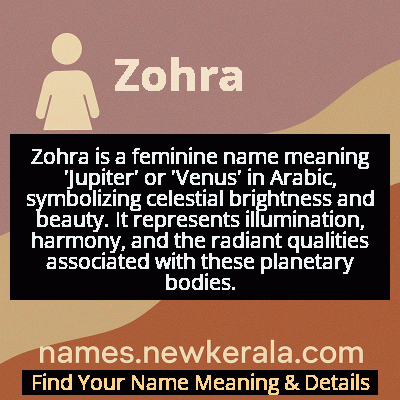Zohra Name Meaning & Details
Origin, Popularity, Numerology Analysis & Name Meaning of Zohra
Discover the origin, meaning, and cultural significance of the name ZOHRA. Delve into its historical roots and explore the lasting impact it has had on communities and traditions.
Name
Zohra
Gender
Female
Origin
Unknown
Lucky Number
5
Meaning of the Name - Zohra
Zohra is a feminine name meaning 'Jupiter' or 'Venus' in Arabic, symbolizing celestial brightness and beauty. It represents illumination, harmony, and the radiant qualities associated with these planetary bodies.
Zohra - Complete Numerology Analysis
Your Numerology Number
Based on Pythagorean Numerology System
Ruling Planet
Mercury
Positive Nature
Adventurous, dynamic, curious, and social.
Negative Traits
Restless, impatient, inconsistent, prone to indulgence.
Lucky Colours
Green, white.
Lucky Days
Wednesday.
Lucky Stones
Emerald.
Harmony Numbers
1, 3, 9.
Best Suited Professions
Sales, marketing, travel, entertainment.
What People Like About You
Versatility, charisma, adventurous spirit.
Famous People Named Zohra
Zohra Sehgal
Actress, Dancer
Pioneering Indian actress with eight-decade career, Padma award recipient
Zohra Drif
Lawyer, Activist
Key figure in Algerian War of Independence, prominent lawyer
Zohra Bensemra
Photojournalist
Award-winning Reuters photojournalist covering major conflicts
Zohra al-Fassia
Singer, Composer
Legendary Moroccan-Jewish singer of Andalusian music
Name Variations & International Equivalents
Click on blue names to explore their detailed meanings. Gray names with will be available soon.
Cultural & Historical Significance
Extended Personality Analysis
Individuals named Zohra typically exhibit a radiant personality characterized by natural charm, intelligence, and artistic sensibility. They often possess the celestial brightness their name suggests, illuminating social situations with their warmth and wit. Zohras tend to be creative problem-solvers who approach challenges with both imagination and practical wisdom. Their personality combines emotional depth with intellectual curiosity, making them excellent communicators who can connect with diverse people. Many demonstrate a strong sense of aesthetics and harmony, whether in artistic pursuits, personal style, or creating beautiful environments. While they can be idealistic, Zohras usually maintain enough pragmatism to turn their visions into reality. They often serve as peacemakers in conflicts, using their diplomatic skills and intuitive understanding of human nature to find common ground. The combination of their celestial name meaning and grounded personality creates individuals who can inspire others while remaining accessible and authentic in their relationships.
Modern Usage & Popularity
In contemporary times, Zohra maintains its cultural relevance while adapting to global naming trends. The name enjoys consistent popularity in Arabic-speaking countries and Muslim communities worldwide, valued for its traditional roots and elegant sound. Recent years have seen increased interest in celestial names, benefiting Zohra's appeal among parents seeking meaningful, culturally rich names. The variant 'Zoya' has achieved broader international recognition, particularly in South Asia and among Western parents attracted to its melodic quality and exotic flair. Social media and global migration patterns have facilitated the name's spread beyond traditional regions, with Zohra appearing more frequently in multicultural societies. While not ranking among the most popular names in English-speaking countries, it maintains a steady presence in diverse urban centers and among families celebrating their Middle Eastern or North African heritage. The name's combination of historical depth, celestial symbolism, and phonetic beauty ensures its continued relevance in an increasingly globalized naming landscape.
Symbolic & Spiritual Meanings
Symbolically, Zohra embodies the essence of celestial illumination and harmonious beauty. As the name for Venus, it represents the planet's dual nature as both morning and evening star - symbolizing transitions, new beginnings, and the balance between light and darkness. This duality extends to represent the integration of contrasting qualities: strength and gentleness, wisdom and creativity, earthly presence and spiritual aspiration. The name carries metaphorical associations with guidance, as Venus has historically served as a navigational reference point. It symbolizes the ability to maintain one's brightness even in challenging circumstances, much like the planet visible in both dawn and dusk. Zohra also represents refined feminine energy - not merely physical beauty but the luminosity of intelligence, grace, and creative power. The name suggests someone who brings clarity to confusion, beauty to ordinary moments, and inspiration to practical endeavors, serving as a living embodiment of celestial harmony made manifest in human form.

